Ibrohim Usmonov: «Government did not assume a lifetime warranty for the opposition»
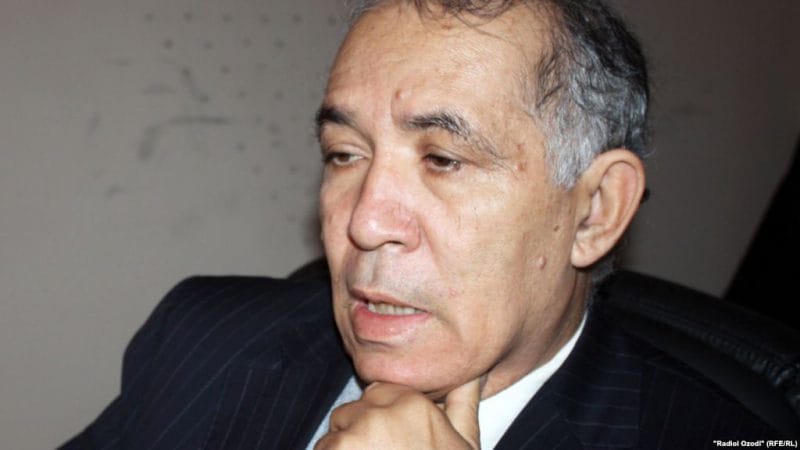
Dushanbe, 10.07.2015. (NIAT «Khovar»). — The appeal of leaders of the Islamic Renaissance Party of Tajikistan that this party and its members are subjected to persecution and pressure by the state authorities are today widely discussed in the media. In an interview with NIAT «Khovar» former Adviser to the President of Tajikistan, Professor Ibrohim Usmonov told how these treatments of the party are groundless and unlawful.
You are an active participant in the inter-Tajik talks, were witness to major and life-changing moments of the negotiations between the Government and oppositions. Given all this, what can you say about the letter of the IRPT leadership to the international organizations and the States-guarantors of the Tajik peace talks?
— Indeed, the Government and the United Tajik Opposition (UTO) are two sides of the peace. The UTO consists of various groups and parties, such as the Islamic Renaissance Party, the Democratic party of Tajikistan, the Focal point of democratic forces of Tajikistan, Fund «Umed», as well as at the beginning of negotiations — movement «Rastokhez». Then the IRP was not a party, it was called the movement of Islam revival.
It should be noted that, in the Protocol on military issues was pointed that after thereof militants of UTO will be disarmed and integrated into power and military structures of the country, UTO from military-political bloc will turn into an ordinary political force. According to this Protocol, on August 8, 1999, the Islamic Renaissance Party, the Democratic party of Tajikistan and others have appeared in the political arena of the country as separate political parties. At the same time was stopped the activity of UTO. There are separate parties, which were a part of the UTO, the IRPT was a part of the UTO, but UTO today no longer exists, and the IRP is a modern Tajik opposition force acting on its programme. This opposition force has nothing to do with the former UTO. In what sense? As far back as 1999, during the presidential elections part of the members of the IRPT, including Mr. Turajonzoda and his associates, part of the members of the DPT, headed by M. Iskandarov supported the candidacy of Emomali Rahmon, and the other part of the IRP headed by S. Nuri supported the candidacy of Davlat Usmon. There were still other members of the DPT who supported the candidacy of Sulton Quvvatov, etc. UTO, which is today referred to already in 1999 did not exist.
Regarding the appeal of the IRP to the countries-guarantors I would like to note the following: on May 28, 1997 in Tehran a individual Protocol of the countries-guarantors has been signed. According to this Protocol, international organizations, including the UN, the OIC, and the number of countries in the period of transition would act as guarantors of peace. Transition period in Tajikistan lasted from June 27, 1997 to March 31, 2000. The guarantors of peace in Tajikistan were created specifically for this period. For ensuring peace by the international organizations and countries-guarantors was created «Communication Group», the head of which was appointed the UN representative. On April 18, 2000 «Communication Group» ceased its functioning and officially issued a statement which said that Tajikistan has established peace and with consideration of national reconciliation «Communication group» officially stops its activity.
In other words, all the commitments that the government took upon itself, belong to the transitional period. In the Protocol signed in February 1997 in Mashhad, it was stated that the transition period would last 1.5 — 2 years, and then in Tajikistan would be held parliamentary elections. With parliamentary elections the transition period is completed. The Government did not assume a lifetime warranty for the opposition. The Government pledged to provide them with the conditions for participation in elections, if they can win the elections, will have seats in the government and Parliament.
After a transition period in Tajikistan no longer exist the so-called supporters of the government or the opposition, all are Tajiks and Tajik people, as both parties have reached peace and harmony. After the transition period, all candidates for Executive positions are appointed based on their knowledge, skills, and not on the basis of belonging to certain political parties. The essence of all signed protocols meant that at the expiration of the transition period in Tajikistan will not be split on the so-called government forces or non-governmental groups. Any party or power have no right to claim, as the term of all the signed protocols, the period of the guarantees of our peace, the time of adoption of all documents and agreements expired on March 31, 2000, after the presidential and parliamentary elections. Then it was officially made a statement about the end of activity of the NRC (the National Reconciliation Commission).
Does it mean that after 2000, all events and phenomena as if starting from scratch, from zero?
— Of course! After March 31, 2000 to the present time, all political parties in Tajikistan are working independently, according to their program, and each party has the right to express its dissatisfaction, but it has to be on behalf of the party and not on behalf of a non-existent association.
IRP declared on boycott of the Day of national unity. Really the political party has the right to boycott the world made by the whole nation, the peace that was necessary to our state?
National unity will not collapse if one or two people or one political party is boycotting it. The word unity means the creation of a Union. If IRP members really declare about the boycott of unity, it means that they don’t want to be the other side of the peace.
Arises question, to whom asked IRP members? The question is that, the UN peacekeeping force, ended their activities in 2007. The UN in 2007 was convinced that peace has been established in Tajikistan, Tajikistan continues without the participation of any individual education UN will be able to go further. Next question. Tajikistan is a sovereign, independent state in the world and is not a structural part of any international organization or not is dependent on other countries-guarantors. The Government of Tajikistan comprehensively and in equal rights cooperates with all international organizations, resolves global issues, offers solutions to modern threats, and not the Islamic Renaissance Party. It has the right to appeal to the international organizations, the state, but not a single party.
No party in Tajikistan has a right to declare about itself as the heir of UTO, including the Islamic Renaissance Party, the Democratic party or other parties of the peace talks, as all of them began their activities anew, according to the political Protocol signed on May 19, 1997 in Bishkek. On the basis of this Protocol, all of the former opposition forces began their work as a separate political party (the Democratic party on its way, the Islamic party in a different way).
Now the question is, is the activity of political parties compatible with the principle of party? I think the problem lies here with political activity is a religious activity which, in the conditions of Tajikistan is not valid, the party is one thing, religion is another. If the IRP under the laws of the country were operating, complied with the requirements of the secular state system of Tajikistan, its activities are not contrary to the democratic development of Tajikistan, it can continue its operations. And if not, then the relevant authorities should consider this issue and take an appropriate decision. According to the Protocol from August 17, 1997 to uphold the Constitution of Tajikistan is the main objective of all parties and the main purpose of peacekeeping.











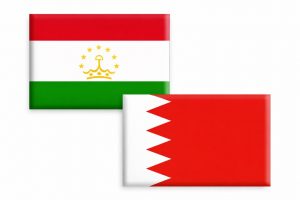 Joint Statement by the Ministries of Foreign Affairs of the Republic of Tajikistan and the Kingdom of Bahrain on the Occasion of the 30th Anniversary of the Establishment of Diplomatic Relations
Joint Statement by the Ministries of Foreign Affairs of the Republic of Tajikistan and the Kingdom of Bahrain on the Occasion of the 30th Anniversary of the Establishment of Diplomatic Relations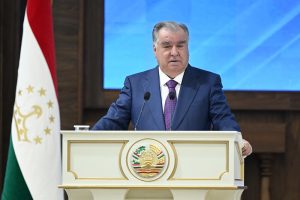 The Political School of the Leader of the Nation in the Context of the Activities of the People’s Democratic Party of Tajikistan
The Political School of the Leader of the Nation in the Context of the Activities of the People’s Democratic Party of Tajikistan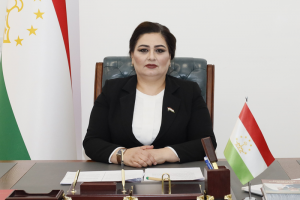 Modern Parliamentarism and the Role of the Asian Forum of Parliamentarians on Population and Development: From Experience Sharing to Practice-Oriented Policy Worldwide
Modern Parliamentarism and the Role of the Asian Forum of Parliamentarians on Population and Development: From Experience Sharing to Practice-Oriented Policy Worldwide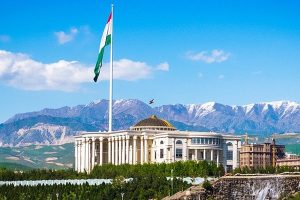 TAJIKISTAN — A LAND OF GLACIERS AND GLOBAL INITIATIVES. The Dushanbe Conference Marks a New Era in Glaciers’ Preservation
TAJIKISTAN — A LAND OF GLACIERS AND GLOBAL INITIATIVES. The Dushanbe Conference Marks a New Era in Glaciers’ Preservation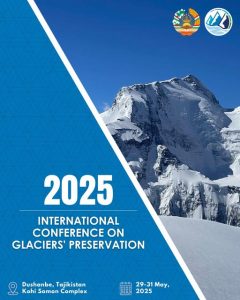 High-Level International Conference on Glacier Preservation to Serve as Global Platform for Resource Mobilization
High-Level International Conference on Glacier Preservation to Serve as Global Platform for Resource Mobilization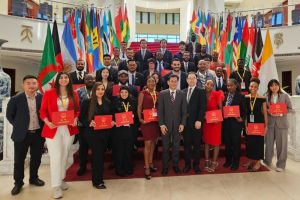 Belt and Road Initiative Bridges Nations, Cultures, and Futures Through Media and Communication
Belt and Road Initiative Bridges Nations, Cultures, and Futures Through Media and Communication ROGUN — A MASTERPIECE OF NEW ENERGY AND CLEAN TECHNOLOGIES. This Greatest Facility Will Lead Tajikistan to Complete Energy Independence
ROGUN — A MASTERPIECE OF NEW ENERGY AND CLEAN TECHNOLOGIES. This Greatest Facility Will Lead Tajikistan to Complete Energy Independence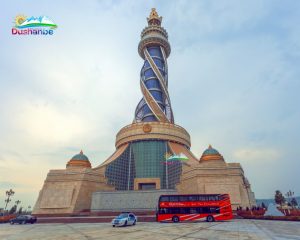 Majestic and Tourist Site of Dushanbe Istiklol Square Wins the Hearts of Capital’s Residents and Guests
Majestic and Tourist Site of Dushanbe Istiklol Square Wins the Hearts of Capital’s Residents and Guests Sheep of the Hissor Breed Are Originally Tajik and Considered the Largest in the World
Sheep of the Hissor Breed Are Originally Tajik and Considered the Largest in the World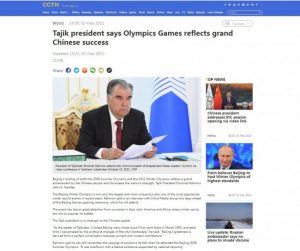 President of Tajikistan Emomali Rahmon Answers Questions of Chinese Official Media on the Eve of the Winter Olympic Games
President of Tajikistan Emomali Rahmon Answers Questions of Chinese Official Media on the Eve of the Winter Olympic Games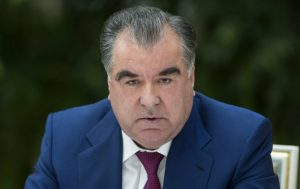 The Voice of the President of Tajikistan. The World Has Heard It and Should Collectively Support It!
The Voice of the President of Tajikistan. The World Has Heard It and Should Collectively Support It!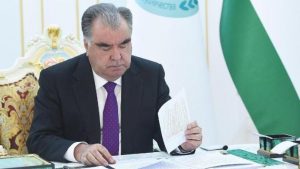 TWENTY YEARS OF THE SCO: COOPERATION FOR STABILITY AND PROSPERITY. Article by the President of Tajikistan, Chairman of the Council of Heads of SCO Member States in 2021 Emomali Rahmon
TWENTY YEARS OF THE SCO: COOPERATION FOR STABILITY AND PROSPERITY. Article by the President of Tajikistan, Chairman of the Council of Heads of SCO Member States in 2021 Emomali Rahmon














